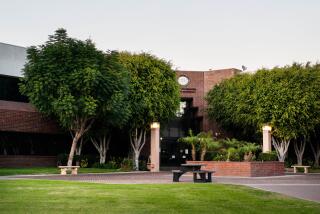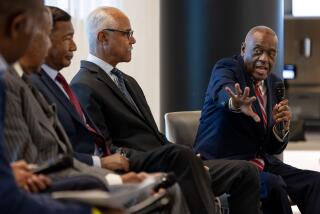Blood Brothers and Sisters : A simple pinprick can save a life. It’s critical for more African Americans to be listed on donor registries.
Charlene Drew Jarvis is the daughter of pioneer physician Charles R. Drew, and she is dismayed. Her father developed the method by which blood plasma is stored and saved, enabling hospitals to keep standing blood supplies. Scores of us learned in elementary school that he died of injuries sustained in an automobile crash and exacerbated because the hospitals near the accident, in rural North Carolina, refused to take him in. Drew was an African American.
It’s a good story, his daughter acknowledges, one that’s saturated with irony: The black man who created the blood bank dies from lack of a transfusion, thanks to white racism. Except that it’s not true. Drew died in the hospital emergency room despite the prompt medical attention he received. And Jarvis is distressed because the myth of her father’s death is a barrier to encouraging more African Americans to consider donating blood, bone marrow and organs.
Jarvis, a board member of the American Red Cross, has been crisscrossing the country trying to set the record straight and urge African Americans to give blood and submit to the simple pinprick that would get them listed in national donor registries. But she has encountered considerable reluctance.
That hesitation is not illogical. People think of the notorious experiment that began in the 1930s, in which black men in Tuskegee, Ala., clinics were surreptitiously injected with live syphilis virus so that the Army could study the disease. And of the most recent admission by the Department of Energy that bits of radioactive plutonium were injected into patients of all races without their knowledge.
But the need for donors in our community is critical. Persons of African descent, for example, almost exclusively are affected by sickle-cell anemia. These patients “have and need a rare blood property, and it can only come from African Americans,” says Red Cross spokesman Felix Perez.
And despite what some skeptics may think, there is no A-list for receiving blood: “Blood is a public resource,” Perez notes, “and it goes to anyone who needs it.” Last year, the Rare Blood Donor Registry distributed nearly 1,700 life-saving units--almost 25% of which went to sickle-cell patients. Clearly, if more people donated, more people could be helped.
Mostly, says Dr. Reed Tuckson, president of Charles R. Drew University of Medicine in Los Angeles, the low donor numbers among African Americans indicate a need for public education. “It’s particularly important for us, because of the violence and trauma that challenge our community,” he says. “We have a fundamental responsibility to give this gift of life.”
He has an ally in Cal Davis, who, like Charlene Jarvis, began his mission based on an intensely personal catalyst. Davis’ wife Judie died of leukemia last year because a suitable bone-marrow donor could not be found in the National Marrow Donor Program. Because marrow is so genetically and racially specific, finding a compatible donor is a long shot anyway, but the odds become even more steep if one’s donor pool is small. And as recently as two years ago, it was infinitesimal for African Americans.
Having been made painfully aware of the paucity of donors, the Davises established the Judie Davis Marrow Donor Recruitment Program to encourage minority members to donate. “All it takes is a blood sample,” Davis says, “but giving that sample is like registering to vote: It puts you in position to cast your ballot later on, if necessary.” In fact, most people who give samples and are typed are never called on to donate marrow, but for African Americans and other minorities, having such tiny donor pools from which to choose lowers the odds that much more. (Thanks to Davis, the number of African Americans registered has swelled from 200 to 61,000.)
Jarvis, Tuckson and Davis agree that it is critical for more African Americans to become involved in helping us save our own lives. “I’d like my father’s long-term legacy to be one of saving lives and encouraging others to do the same,” Jarvis says. And as Davis notes, giving blood or becoming a potential marrow donor comes with an extraordinary fringe benefit: “You’re putting yourself in the position to save somebody’s life during your lifetime.”
To donate blood, contact your local Red Cross. To find out more about bone-marrow donation, call the Judie Davis marrow donor program: (800) 628-1413.
More to Read
Sign up for Essential California
The most important California stories and recommendations in your inbox every morning.
You may occasionally receive promotional content from the Los Angeles Times.










